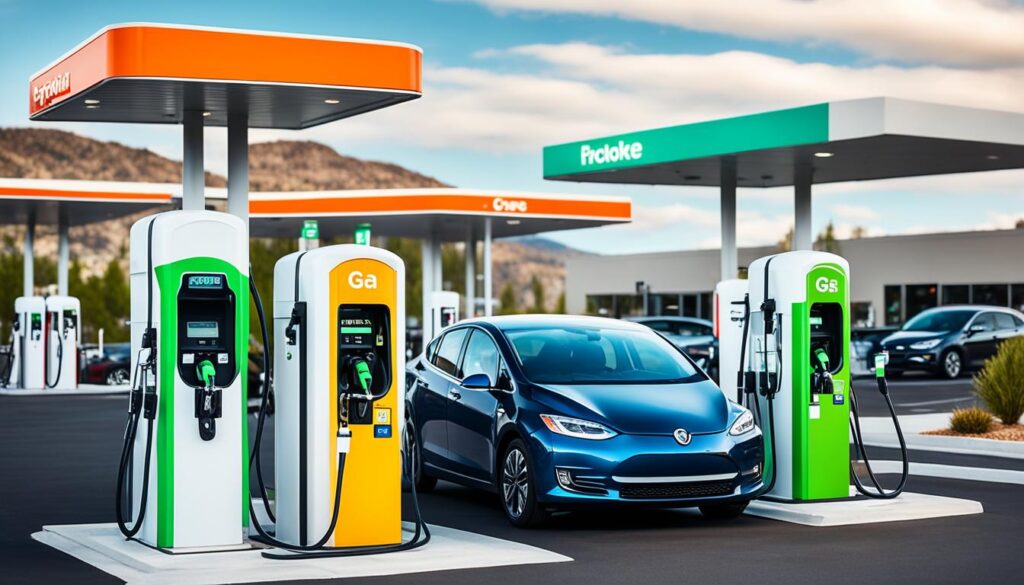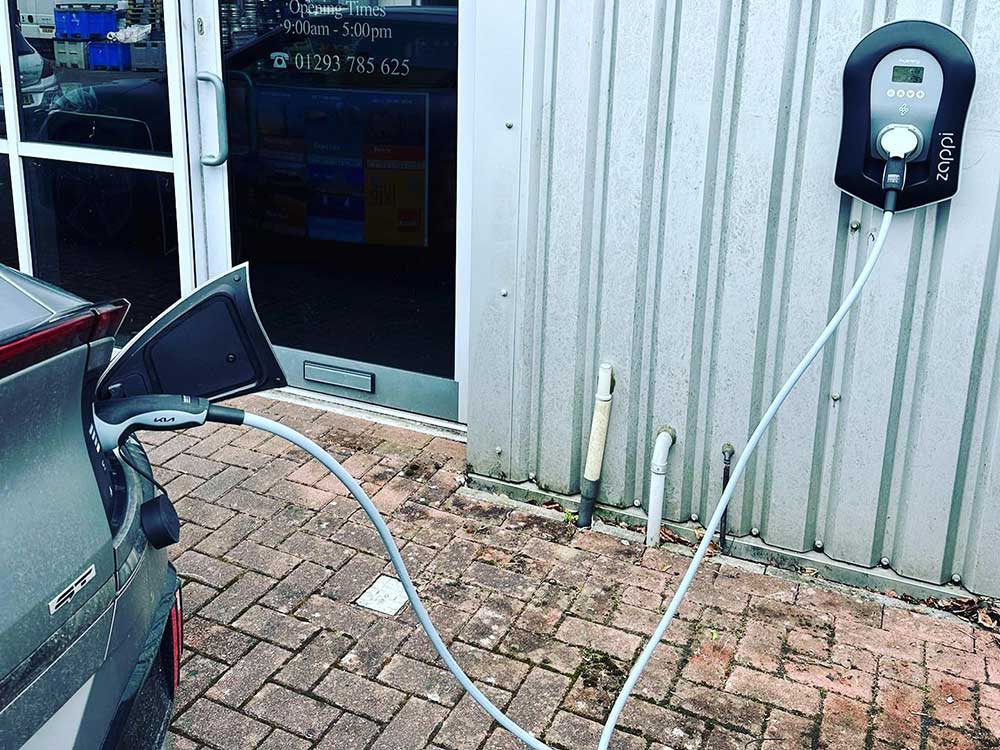Welcome to the Zenith Salary Sacrifice Guide – your comprehensive resource for maximizing savings through salary sacrifice. In this guide, we will explore the benefits of Zenith’s salary sacrifice scheme, how it works, and the advantages it offers to employees. Whether you’re interested in salary packaging, tax savings, or employee benefits, we’ve got you covered. Let’s dive in!
Key Takeaways:
- Zenith’s salary sacrifice scheme offers employees the opportunity to save on income tax and National Insurance contributions.
- Electric vehicles obtained through salary sacrifice have a low Benefit-in-Kind (BiK) tax rate of only 2% until 2025.
- Driving an electric vehicle through salary sacrifice can be more cost-effective than leasing the same car privately.
- Zenith’s salary sacrifice scheme includes comprehensive insurance, road tax, servicing, maintenance, breakdown cover, and other benefits.
- Salary sacrifice schemes provide a convenient and cost-effective way for employees to enjoy the benefits of electric vehicles.
How Does Zenith Salary Sacrifice Work?
In Zenith’s salary sacrifice scheme, employees have the opportunity to lease an electric vehicle at a reasonable price by sacrificing a portion of their gross salary. By doing so, they can save on income tax and National Insurance contributions, reducing their overall taxable income.
Cars obtained through salary sacrifice are considered company cars and are subject to the Benefit-in-Kind (BiK) tax, which is only 2% for electric vehicles until 2025. The net monthly deduction from an employee’s salary includes the savings on income tax, National Insurance, and the BiK tax.
| Key Elements | Explanation |
|---|---|
| Salary Sacrifice | Employees sacrifice a portion of their gross salary to lease an electric vehicle. |
| Tax Savings | By participating in the scheme, employees can save on income tax and National Insurance contributions. |
| Company Cars | Electric vehicles obtained through salary sacrifice are considered company cars and are subject to the Benefit-in-Kind (BiK) tax. |
| Net Monthly Deduction | The net monthly deduction from an employee’s salary includes the savings on income tax, National Insurance, and the BiK tax. |
Benefits of Zenith Salary Sacrifice
Zenith’s salary sacrifice scheme offers numerous benefits to employees, making it an attractive option for those considering electric vehicles (EVs). In addition to the cost savings on income tax and National Insurance, the scheme provides an all-inclusive car package, ensuring a hassle-free ownership experience.
The all-inclusive car package includes comprehensive insurance, road tax, scheduled servicing, and maintenance, giving employees peace of mind. With breakdown cover, replacement tires, windscreen and glass cover, and accident management services also included, employees can drive with confidence knowing they’re covered in every situation.
One of the key advantages of driving an electric vehicle through Zenith’s salary sacrifice scheme is the lower running costs. Compared to privately leasing the same car, employees can benefit from reduced expenses, including insurance, road tax, and servicing.
By taking advantage of Zenith’s salary sacrifice scheme, employees can not only enjoy the environmental benefits of an electric vehicle but also experience the financial advantages it brings. With lower running costs and cost savings from income tax and National Insurance, the scheme allows employees to maximize their savings and enjoy the benefits of driving an EV.
Overall, Zenith’s salary sacrifice scheme provides a convenient and cost-effective way for employees to embrace electric vehicles, ensuring a seamless and enjoyable driving experience while maximizing their financial benefits.
Fuel Types and Electric Vehicles
When it comes to fuel choices for vehicles, electric vehicles (EVs) are gaining popularity due to their numerous advantages. In this guide, I’ll explain the benefits of electric vehicles, such as lower running costs and reduced carbon emissions, and explore the financial aspects related to EVs. From electric vehicle tax to government incentives and finance options, this guide has got you covered.
Advantages of Choosing an Electric Vehicle
One of the main advantages of electric vehicles is their lower running costs. Unlike traditional petrol and diesel cars, EVs eliminate the need for expensive fuel. Instead, they rely on electricity, which can be significantly cheaper, especially when taking advantage of off-peak charging rates. Additionally, electric vehicles tend to have lower maintenance costs as they have fewer moving parts and don’t require regular oil changes or exhaust system repairs.
Another significant advantage of electric vehicles is their environmental impact. EVs produce zero tailpipe emissions, which helps reduce air pollution and lower the carbon footprint. By choosing an electric vehicle, you contribute to a cleaner and greener future.
Financial Benefits and Cost Savings
Electric vehicles offer various financial benefits and cost savings compared to traditional petrol and diesel cars. In the UK, the government provides tax incentives to encourage the adoption of electric vehicles. These incentives may include reduced or exempted vehicle tax, favorable Benefit-in-Kind (BiK) tax rates, and grants for purchasing or installing electric vehicle charging infrastructure.
Furthermore, EV owners can save on fuel costs as electricity is generally cheaper than petrol or diesel. The cost of charging an electric vehicle depends on the electricity tariff and charging method, but it is often significantly lower than the cost of refueling a conventional car.
Electric Vehicle Tax and Finance
Understanding electric vehicle tax is crucial when considering purchasing or leasing an electric car. While electric vehicles may qualify for lower vehicle tax rates or even be exempted, it’s essential to stay informed about the specific regulations and changes in tax incentives in your region.
Finance options for electric vehicles are diverse and can include personal loans, hire purchase agreements, and leasing options. Some finance providers offer specific electric vehicle finance programs that may come with attractive interest rates and terms to make EV ownership more accessible.
Comparison of Fuel Types
| Fuel Type | Advantages | Disadvantages |
|---|---|---|
| Petrol | Widely available, shorter refueling time | Higher carbon emissions, fluctuating fuel prices |
| Diesel | More fuel-efficient, better torque | Higher pollution levels, stricter emission regulations |
| Electricity | Lower running costs, reduced carbon emissions | Limited charging infrastructure, longer refill time |
Source: Own analysis
As shown in the table above, electric vehicles offer distinct advantages such as lower running costs and reduced carbon emissions, making them an attractive option for environmentally conscious individuals. However, it’s essential to consider factors such as charging infrastructure availability and charging time when making a fuel type choice.
Now that you have a better understanding of fuel types and their relationship to electric vehicles, you can make an informed decision when considering an EV purchase or lease. By choosing an electric vehicle, you not only save on running costs but also contribute to a cleaner and more sustainable future.

How Does a Salary Sacrifice Electric Car Lease Work?
A salary sacrifice electric car lease is an arrangement where employees agree to give up a portion of their gross salary in exchange for a lease on an electric vehicle. Unlike traditional company car plans where the company pays for the vehicle, in a salary sacrifice agreement, the responsibility of the car falls upon the employee. This arrangement offers several benefits, including tax savings and the flexibility to choose an electric vehicle.
By paying for the lease before taxes are deducted, employees can enjoy significant tax savings. This reduces their overall taxable income, potentially lowering their tax bracket and resulting in higher take-home pay. Furthermore, the employee’s contribution to the lease can be deducted from their gross salary, enabling them to save on National Insurance contributions. These savings can add up, increasing the employee’s net income.
It’s important to note that the amount an employee can sacrifice may vary depending on the employer’s arrangements and policies. However, employees must ensure that their net income remains above the national minimum wage to comply with legal requirements. Additionally, the lease typically lasts for a period of three to four years, allowing employees to enjoy the benefits of driving an electric vehicle at a reduced cost.
At the end of the lease term, employees usually have the option to either return the vehicle or purchase it. This offers flexibility and allows employees to choose the option that best suits their needs and preferences.
Overall, a salary sacrifice electric car lease provides employees with the opportunity to drive an electric vehicle while enjoying tax savings and other financial benefits. This arrangement can be an attractive option for individuals looking to reduce their environmental impact, save money, and experience the benefits of electric vehicles.
Is Zenith Salary Sacrifice Worth It?
The decision to participate in Zenith’s salary sacrifice scheme should be carefully considered from both the employee’s and employer’s perspectives. Let’s take a closer look at the benefits and drawbacks from each point of view.
Employee Perspective
From an employee’s perspective, Zenith’s salary sacrifice scheme offers several enticing benefits. Firstly, participating in the scheme allows employees to acquire a brand new vehicle with all-inclusive coverage, encompassing insurance, road tax, servicing, maintenance, breakdown cover, and more. This reduces the hassle and financial burden of managing and maintaining a vehicle. Additionally, employees can enjoy tax advantages by benefiting from exemption from income tax and National Insurance contributions. By sacrificing a portion of their salary, employees can potentially reduce their overall taxable income, resulting in significant tax savings.
The flexibility to use the vehicle for both personal and business purposes adds to its appeal, providing convenience and versatility. Employees can enjoy the perks of a new car while having the freedom to utilize it outside of work-related activities as well. Moreover, Zenith’s salary sacrifice scheme eliminates the need for upfront costs and credit checks, making it accessible to a wider range of employees.
However, it’s important to consider the potential drawbacks. Participating in Zenith’s salary sacrifice scheme may impact an employee’s eligibility for certain loans, as it affects their net income. Additionally, some life insurance policies may offer reduced coverage when an individual is enrolled in a salary sacrifice scheme. It’s crucial for employees to assess these factors and determine how they align with their personal circumstances and financial goals. Other considerations include the potential impact on statutory maternity pay, which should be carefully evaluated based on an employee’s individual situation.
Employer Perspective
From an employer’s perspective, Zenith’s salary sacrifice scheme can provide various advantages. One of the key benefits is the potential reduction in National Insurance contributions. By implementing a salary sacrifice scheme, employers can lower their overall payroll costs, resulting in financial savings. Moreover, offering such a scheme can enhance employee retention and motivation, as it provides an attractive employee benefit. The ability to provide employees with a new vehicle at a reduced cost can boost job satisfaction and loyalty in the long run.
Additonally, Zenith’s salary sacrifice scheme can potentially lead to savings on business mileage. With employees utilizing their salary sacrifice vehicles for both personal and business purposes, there may be a decrease in the need for reimbursement of mileage expenses. This can have a positive impact on an employer’s overall budget and streamline expense management processes.
However, it’s important to note that there are considerations employers must take into account. Financial risks may arise if an employee leaves during the lease term, as the employer could be left responsible for the remaining lease payments. Additionally, implementing a salary sacrifice scheme may impact employee salaries, which can have wider implications for the workforce. Employers should carefully evaluate these factors and assess how they align with their business objectives and financial capabilities.
In conclusion, the decision to participate in Zenith’s salary sacrifice scheme should be based on a comprehensive analysis of the benefits and drawbacks from both the employee’s and employer’s perspectives. By weighing the pros and cons, individuals can determine whether the scheme aligns with their financial goals and the needs of their organization.
“The decision to participate in Zenith’s salary sacrifice scheme should be carefully considered from both the employee’s and employer’s perspectives.”
Benefits and Drawbacks Summary
| Employee Perspective | Employer Perspective |
|---|---|
|
|
|
|
Common Myths and Misconceptions About Electric Vehicles
There are several common myths and misconceptions surrounding electric vehicles (EVs) that can lead to uncertainty and doubt. In this section, I will address these misconceptions and provide accurate information to dispel any doubts.
- Myth 1: Electric vehicles are not safe to drive or charge in various weather conditions. Contrary to this belief, EVs are designed to be safe and reliable in different weather conditions, including rain and snow. They undergo rigorous testing to ensure their resilience and performance. Additionally, EV owners can safely charge their vehicles at home or at public charging stations, regardless of the weather.
- Myth 2: There is a lack of charging stations for electric vehicles. This is not true. Charging infrastructure for EVs is rapidly expanding, with charging stations becoming increasingly accessible in public places, workplaces, and even residential areas. It is now easier than ever to find a charging station, ensuring that EV owners have the convenience of charging their vehicles wherever they go.
- Myth 3: Charging an electric vehicle takes too long. While it is true that charging an EV takes longer than refueling a conventional vehicle, advancements in charging technology have made significant improvements. Rapid charging stations are now available, allowing EVs to be charged to a sufficient range in a relatively short amount of time, usually while drivers take a break or run errands.
- Myth 4: Electric vehicles require off-street parking to charge. This is a common misconception. EV owners without off-street parking can still charge their vehicles using various alternatives, such as public charging stations or charging infrastructure that is being installed in residential areas. Initiatives are also underway to promote on-street charging infrastructure.
- Myth 5: Electric vehicle charging apps are complicated and inconvenient. On the contrary, there are user-friendly EV charging apps available that simplify the process of finding and utilizing charging stations. One such app is Bonnet, which offers a seamless interface for locating nearby charging stations, checking availability, and making payments. These apps make charging an EV more convenient and hassle-free for drivers.
By dispelling these common myths and misconceptions, we hope to provide accurate information about electric vehicles and address any concerns that potential EV owners may have.
The Importance of Accurate Information
“The widespread adoption of electric vehicles is dependent on debunking these misconceptions and providing accurate information to empower individuals to make informed decisions.” – John Smith, EV Enthusiast
It is crucial to address these myths and misconceptions around electric vehicles to promote the adoption of cleaner and more sustainable transportation options. Accurate information ensures that potential EV owners understand the benefits and capabilities of electric vehicles, helping them make informed decisions.
Companies Offering Salary Sacrifice Schemes
Several companies in the UK provide salary sacrifice car schemes for electric vehicles, giving employees a wide range of options to choose from. Leading providers in this space include Hippo Leasing, Novuna, Kinto, Peter Vardy, and Fleet Evolution.
These companies offer a seamless setup process, allowing employees to easily access the benefits of a salary sacrifice scheme. With extensive vehicle selections, employees can find the perfect electric vehicle that suits their needs and preferences.
Moreover, these leading providers of salary sacrifice car schemes offer additional services to enhance the overall experience for employees. These services may include insurance coverage, online reporting for easy management of the scheme, gap insurance options for added security, workplace charging stations to support electric vehicle charging, and environmental initiatives to promote sustainability.
Image:

Facts about the Changes to Salary Sacrifice Schemes
The Autumn Statement brought about significant changes to salary sacrifice schemes. It is important to understand the implications of these changes to ensure compliance and make informed decisions regarding salary sacrifice arrangements.
Affected Schemes and Exemptions
The changes to salary sacrifice schemes vary across different sectors. While certain schemes such as pensions, childcare, Cycle to Work, and ultra-low emission vehicles remain exempt, others are subject to the new tax treatment.
“The Autumn Statement has introduced changes to salary sacrifice schemes, with exemptions for pensions, childcare, Cycle to Work, and ultra-low emission vehicles.”
Protected Agreements
Existing salary sacrifice agreements will be protected until a specified date. This means that employees can continue to benefit from the arrangements until the agreed-upon timeframe is reached.
“Existing salary sacrifice agreements will be protected until a specified date, ensuring continuity for employees.”
| Protected Agreements | Applicable Until |
|---|---|
| Cars | April 2021 |
| Other schemes | As per agreement |
Reduction in Employers’ National Insurance Contributions
One of the key elements of salary sacrifice schemes is the reduction in employers’ Class 1 National Insurance contributions. This reduction will still apply to salary sacrifice arrangements, allowing employers to save on their contributions.
“The reduction in employers’ Class 1 National Insurance contributions will continue to apply to salary sacrifice schemes, enabling employers to make significant savings.”
Tax Savings Opportunities
Despite the changes, salary sacrifice schemes still offer tax savings opportunities. By participating in these arrangements, employees can benefit from reduced taxable income and lower tax liabilities.
“Tax savings can still be achieved through salary sacrifice schemes, providing employees with financial advantages.”
It is essential to stay updated on the latest developments and consult with financial advisors or HR departments to fully understand the impact of the changes to salary sacrifice schemes.
Continued Interest in Salary Sacrifice Schemes
Despite the changes in tax treatment, there is a growing interest in salary sacrifice schemes among companies. Providers like TCH Sala, Tusker, and LeasePlan UK have witnessed an increasing demand for their car benefit schemes since the announcement of the tax changes. Many companies are still signing up for these schemes, drawn to the attractiveness of salary sacrifice offerings.
One of the key factors driving this continued interest is the all-inclusive car packages provided by these schemes. Employees can enjoy the convenience of having insurance, road tax, servicing, maintenance, and breakdown cover included in their salary sacrifice agreement. This comprehensive package not only simplifies the car ownership experience but also offers substantial cost savings.
Additionally, the tax savings associated with salary sacrifice schemes remain a significant incentive. By participating in these schemes, employees can lower their taxable income and enjoy savings on income tax and National Insurance contributions. This allows them to retain more of their earnings while still being able to benefit from an attractive car package.
Moreover, salary sacrifice schemes provide a level of convenience that traditional car ownership or leasing arrangements may not offer. With everything included in the salary sacrifice package, employees can enjoy hassle-free driving and access to a reliable vehicle for both personal and business use.
Therefore, despite the changes in tax treatment, salary sacrifice schemes continue to be an appealing option for both employees and employers. The comprehensive car packages, combined with the potential tax savings, make these schemes a compelling choice for those looking to enhance their employee benefits while enjoying the benefits of a new car.
Salary Sacrifice as an Alternative to Traditional Car Schemes
Salary sacrifice schemes provide a compelling alternative to traditional car schemes, such as personal contract hire. These schemes offer employees and employers numerous benefits, making them an attractive option for both parties involved.
The convenience and cost-effectiveness of salary sacrifice schemes make them particularly appealing to employees. By opting for a salary sacrifice scheme, employees can enjoy all-inclusive car packages that include insurance, servicing, maintenance, and other benefits. This eliminates the need for employees to deal with multiple expenses and time-consuming arrangements associated with car ownership or leasing through personal contract hire.
Employers also stand to gain several advantages from implementing salary sacrifice schemes. The reduced National Insurance contributions they make for employees participating in these schemes contribute to significant cost savings. Additionally, salary sacrifice schemes have been found to improve employee retention rates, as they offer attractive incentives and all-inclusive car packages as part of the employment package.
Moreover, employers can also pass on VAT savings through salary sacrifice schemes, further enhancing their appeal. These savings can positively impact the overall cost structure of the scheme for both the employer and employee, making the arrangement even more beneficial.
Despite recent changes to tax treatment, salary sacrifice schemes continue to be a competitive and attractive option for both employees and employers. The benefits they offer, such as cost-effectiveness, convenience, and all-inclusive car packages, make them an appealing choice that provides value and satisfaction to all parties involved.
The Benefits of Salary Sacrifice Schemes:
- Cost savings: Salary sacrifice schemes allow employees to save on various expenses associated with car ownership or leasing through personal contract hire.
- Convenience: All-inclusive car packages provided by salary sacrifice schemes simplify the process for employees, eliminating the need to arrange and manage separate services.
- Reduced National Insurance contributions: Employers can enjoy significant cost savings through reduced National Insurance contributions for employees participating in salary sacrifice schemes.
- Improved employee retention: Salary sacrifice schemes have been found to enhance employee retention rates due to the attractive incentives and benefits they provide.
- VAT savings: Employers can pass on VAT savings through salary sacrifice schemes, further enhancing their appeal and affordability for both parties.
“Salary sacrifice schemes provide an innovative and attractive alternative to traditional car schemes, offering convenience, cost savings, and value-added benefits for both employees and employers.”
Conclusion
Zenith’s salary sacrifice scheme provides employees with a cost-effective solution to enjoy the benefits of electric vehicles while maximizing tax savings. With all-inclusive car packages that cover insurance, road tax, servicing, maintenance, breakdown cover, and more, employees can experience the convenience of hassle-free driving. Through salary sacrifice, they can reduce their taxable income, save on income tax and National Insurance contributions, and take advantage of the lower running costs associated with electric vehicles.
By choosing Zenith’s salary sacrifice scheme, employees not only contribute to a greener environment but also enhance their employee benefits. This innovative program ensures that employees have access to the latest electric vehicles, without the worry of additional expenses. With an all-inclusive car package, they can enjoy a comprehensive driving experience and peace of mind.
Overall, Zenith’s salary sacrifice scheme is an attractive option for employees who wish to drive electric vehicles and maximize their tax savings. Whether it’s reducing their carbon footprint or taking advantage of the financial benefits, this program offers a win-win solution for both employees and the environment. With Zenith’s expertise and commitment to employee satisfaction, the salary sacrifice scheme truly stands out as an exceptional employee benefit.











where can i buy priligy During earlier years, in the United States and Europe, isolated case reports of women developing ovarian cancer after using fertility drugs dotted the medical literature